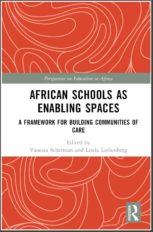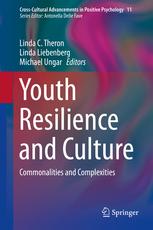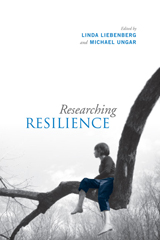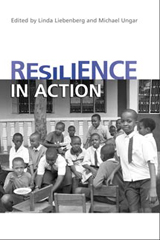Publications
Read more about the process of conducting PAR with youth and the community organisations that serve them in the Special Issue of IJQM on Meaningful Engagement of Youth in Research!
Books

Scherman, V., and Liebenberg, L., (Eds.) (2023). African Schools as Enabling Spaces: A Framework for Building Communities of Care. Routledge.

Theron, L., Liebenberg, L., and Ungar, M. (Eds.) (2015). Youth Resilience and Culture – Commonalities and Complexities. New York, NY: Springer.

L. Liebenberg and M. Ungar (Eds) (2009), Researching Resilience. Toronto: University of Toronto Press.

L. Liebenberg, and M. Ungar (Eds) (2008), Resilience in Action: Working with youth across cultures and contexts. Toronto: University of Toronto Press.
Invited Journal Publications
Liebenberg, L., & VanderPlaat, M. (2021). Understanding resilience promoting resources through biographic narrative and photo-elicitation. The Sociological Observer, 3(1), 181-192.
Liebenberg, L., Jamal, A., & Ikeda, J. (2020). Extending youth voices in a participatory thematic analysis approach. International Journal of Qualitative Methods, 19, 1-13. Doi: 10.1177/1609406920934614
Liebenberg, L. (2018). Thinking critically about Photovoice: What is it, how to do it, and how does it compare to qualitative visual methods? International Journal of Qualitative Methods, 17, 1-9. Doi: 10.1177/1609406918757631
Editorials
Liebenberg, L. (2020). Reflecting on the Losses and Gains of an Unorthodox Year. International Journal of Qualitative Methods. DOI: 10.1177/1609406920984900
Teti, M., Schatz, E., & Liebenberg, L. (2020). Methods in the Time of COVID-19: The Vital Role of Qualitative Inquiries. International Journal of Qualitative Methods. DOI: 10.1177/1609406920920962
Wood, M., & Liebenberg, L. (2019). Considering words and phrasing in the way we write: Furthering the social justice agenda through relational practice. International Journal of Qualitative Methods, 18, 1-4. DOI: 10.1177/1609406919877015
Liebenberg, L. (2019). Continuing the conversation: A second take on innovative elicitation methods. International Journal of Qualitative Methods, 18, 1-4. Doi: 10.1177/1609406919835991
Liebenberg, L. (2018). Generating Findings That Are Able to “Stand on Their Own Feet”: Exploring Innovations in Elicitation Methods. International Journal of Qualitative Methods. DOI: 10.1177/1609406918801666
Sousa, B. J., Clark, A. M., & Liebenberg, L. (2018). The Pioneering Qualitative Spirit: Twenty IJQM Articles Over 20 Years of IIQM. International Journal of Qualitative Methods. DOI: 10.1177/1609406918793269
Clark, A. M., Liebenberg, L., & Sousa, B. J. (2018). The Indispensability and Imperative of Peer Review: A Heartfelt Thanks. International Journal of Qualitative Methods. DOI: 10.1177/1609406918767669
Liebenberg, L. (2017). As Our Journey Continues: The Next Phase of IJQM. International Journal of Qualitative Methods, 16, 1-3. Doi: 10.1177/1609406917734085
Liebenberg, L. (2017). Editor’s Introduction: Special Issue: Understanding Meaningful Engagement of Youth in Research and Dissemination of Findings. International Journal of Qualitative Methods, 16, 1-3. Doi: 10.1177/1609406917721531
Liebenberg, L. (2017). Reviewing to Learn: How the Act of Reviewing Supports Professional Development and the Profession. International Journal of Qualitative Methods, 16, 1-3. Doi: 10.1177/1609406917708380
Liebenberg, L. (2016). Writing to Learn: Why We Should Write, Rewrite, and Rewrite Again. International Journal of Qualitative Methods, 15. Doi: 10.1177/1609406916676150
Book Chapters
Liebenberg, L., Christmas, A., Stevens, R., Nicholas, K., Denny, D., & Bernard, A. (in press). Growing connections: Use of a garden to learn and heal in the context and legacy of systemic and institutionalised racism. In M. R. Carter, Y.-S. Huang, C. Mitchell, D. Ranjan, M. Sorensen, T. Starlight, T. Strong-Wilson, & A. Weenie (eds.), Seasons of Change: Interdisciplinary Pedagogies for Reconciliation and Redress. UBC Press.
Liebenberg, L. (2023). Schools as nodes of care: Bi-directional thinking on resilience in children and the community. In V. Scherman & L. Liebenberg, (Eds.), Supporting schools as communities of care (pp. 13-25). Routledge. https://doi.org/10.4324/9781003051398-2
Smit, B., Scherman, V., & Liebenberg, L. (2023). Thinking qualitatively in the context of mixed methods research: implications for study design. In, R. J. Tierney, F. Rizvi, & K. Erkican, (Eds.), International Encyclopedia of Education (4th Ed) (pp. 478-484). Elsevier. https://doi.org/10.1016/B978-0-12-818630-5.11084-X.
Wall, D., Liebenberg, L., Ikeda, J., Penny, D., & Youth of Spaces & Places, Port Hope Simpson (2021). Understanding community, culture and recreation as resilience resources for Indigenous youth. In L. Moran, K. Reilly, & B. Brady (Eds.), Narrating Childhoods across Contexts: Knowledge, Environment, and Relationships (pp. 163-187). Basingstoke, UK: Palgrave.
Scherman, V., & Liebenberg, L. (2021). Item response theory integrating qualitative data analysis. In B. Johnson & A. Onwuegbuzie (Eds.), The reviewer’s guide to mixed methods research analysis (pp. 117-123). London: Routledge.
Liebenberg, L. & Pelley, E. (2020). Supporting escapees and migrants: Understanding the role of resilience resources. In M. Fingerle & R. Wink (Eds.), Forced Migration and Resilience: Conceptual issues and empirical results (pp. 31-44). Heidelberg, Germany: Springer.
Doolan, K. & Liebenberg, L. (2019). Challenging Inequalities in Education through Research. In M. H. Hoveid, L. Ciolan, A. Paseka, & S Marques da Silva (Eds.), Doing Educational Research: Overcoming Challenges in Practice (pp. 54-71). London: Sage.
Liebenberg, L., Wood, M., & Wall, D. (2018). Participatory Action Research with Indigenous youth and their communities. In R. Iphofen & M. Tolich (Eds.). Handbook of Qualitative Research Ethics (pp. 339-353). London: Sage.
Liebenberg, L., & Hutt-MacLeod, D. (2017). Aboriginal community development approaches in response to neoliberal policy: The example of Eskasoni Mental Health Services. In P. Dolan & N. Frost (Eds.), The Handbook of Global Child Welfare. London: Routledge.
Liebenberg, L. (2016). Researching resilience in a medical context: Understanding the social ecologies promoting positive outcomes. In M. Ferrari & C. DeMichelis (Eds.), Promoting Pediatric Resilience: Interdisciplinary Perspectives from Research and Practice (pp. 293-308). New York, NY: Springer.
Liebenberg, L., Ikeda, J., & Wood, M. (2015). “It’s just part of my culture”: Understanding language and land in the resilience processes of Aboriginal youth. In L. Theron, L. Liebenberg, & M. Ungar (Eds.), Youth Resilience and Culture – Commonalities and Complexities (pp. 105-116). New York, NY: Springer.
Theron. L., & Liebenberg, L. (2015). Understanding cultural contexts and their relationship to resilience processes. In L. Theron, L. Liebenberg, & M. Ungar (Eds.), Youth Resilience and Culture – Commonalities and Complexities (pp. 23-36). New York, NY: Springer.
Liebenberg, L., & Theron. L. (2015). Innovative qualitative explorations of culture and resilience. In L. Theron, L. Liebenberg, & M. Ungar (Eds.), Youth Resilience and Culture – Commonalities and Complexities (pp. 203-216). New York, NY: Springer.
Russell, P., Liebenberg, L., & Ungar, M. (2015). White out: The invisibility of white North American culture and resilience processes. In L. Theron, L. Liebenberg, & M. Ungar (Eds.), Youth Resilience and Culture – Commonalities and Complexities (pp. 131-142). New York, NY: Springer.
Whitman, S., & Liebenberg, L. (2015). Understanding the Experiences and Challenges of Former Child Soldiers Integrating into Canadian Society. In L. Theron, L. Liebenberg, & M. Ungar (Eds.), Youth Resilience and Culture – Commonalities and Complexities (pp. 157-170). New York, NY: Springer.
Liebenberg, L., & Ungar, M. (2014). Using mixed methods in research with young children across cultures and contexts. In O. N. Saracho (Ed.), Handbook of Research Methods in Early Childhood Education: Research methodologies (Volume 1; pp. 383-402). Charlotte, NC: Information Age Publishing.
Ungar, M., & Liebenberg, L. (2013). A Measure of Resilience with Contextual Sensitivity—The CYRM-28: Exploring the Tension Between Homogeneity and Heterogeneity in Resilience Theory and Research. In S. Prince-Embury & D. H. Saklofske (Eds.), Resilience in children, adolescents and adults: Translating research into practice (pp. 245-255). New York, NY: Springer.
Sanders, J., Munford, R., & Liebenberg, L. (2012). Young People, Their Families and Social Supports: Understanding Resilience with Complexity Theory. In M. Ungar (Ed.), The Social Ecology of Resilience: A Handbook of Theory and Practice (pp. 233-243). New York, NY: Springer.
Liebenberg, L., & Ungar, M. (2009). Introduction: The challenges of researching resilience. In L. Liebenberg & M. Ungar (Eds), Researching Youth Resilience (pp. 3-25). Toronto, ON: University of Toronto Press.
Liebenberg, L. (2009). The Use of Image-Based Methods in Research with Youth. In L. Liebenberg and M. Ungar (Eds). Researching Youth Resilience (pp. 129-152). Toronto, ON: University of Toronto Press.
Liebenberg, L., & Ungar, M. (2008). Understanding youth resilience in action: The way forward. In L. Liebenberg & M. Ungar (Eds), Resilience in Action: Working with youth across cultures and contexts (pp. 3-16). Toronto, ON: University of Toronto Press.
Ungar, M., & Liebenberg, L. (2005). Resilience across Cultures: The mixed methods approach of the International Resilience Project. In M. Ungar (Ed.), Handbook for Working With Children and Youth Pathways to Resilience across Cultures and Contexts (pp. 211-226). Thousand Oaks, CA: Sage Publications.
Peer-reviewed publications
Youth of Spaces & Places, Eskasoni, Liebenberg, L., Reich, J., Hutt-MacLeod, D., Denny, J-F., & Gould, M. R. (2022). Two-eyed seeing for youth wellness: Promoting positive outcomes with interwoven resilience resources. Transcultural Psychiatry. DOI:10.1177/13634615221111025 [IF: 2.221]
Liebenberg, L. (2022). Photovoice and being intentional about empowerment. Health Promotion Practice, 23(2), 267-273. DOI: 10.1177/15248399211062902
Medeiros, J. K., Pessoa, A. S. G., Barbosa, A. F., & Liebenberg, L. (2022). ‘Hitting to Teach is One Thing, but to Hurt is a Different Thing, isn’t it?’: Understanding Cycles of Intergenerational Violence within Families. Journal of Family Issues. DOI:10.1177/0192513X211058824. [IF: 2.072]
Liebenberg, L., & Scherman, V. (2021). Resilience and the Sustainable Development Goals (SDGs): Promoting child and youth resilience and related mental health outcomes. Journal of Psychology in Africa, 31(5), 455-463. DOI:10.1080/14330237.2021.1978180 [IF: 0.453]
Liebenberg, L. (2020). Reconsidering interactive resilience processes in mental health: Implications for child and youth services. Journal of Community Psychology, 48(5), 1365-1380. DOI: 10.1002/jcop.22331 [IF: 1.076]
Wood, M., Liebenberg, L., Ikeda, J., Vincent, A., & Youth participants of Spaces & Places (2020). The role of educational spaces in supporting Inuit youth resilience. Child Care in Practice, 26(4), 390-415. DOI:10.1080/13575279.2020.1765143
Maurović, I., Liebenberg, L., & Ferić, M. (2020). A review of family resilience: Understanding the concept and operationalization challenges to inform research and practice. Child Care in Practice, 26(4), 337-357. DOI:10.1080/13575279.2020.1792838
de Souza, N., Pessoa, A., & Liebenberg, L. (2020). How Can the Meanings Attributed to Work by Professionals Influence Families Living in Challenging Communities? Child Care in Practice, 26(4), 431-444. DOI: 10.1080/13575279.2020.1792836
Pessoa, A., Liebenberg, L., Belizário da Fonseca Medeiros, D., & Knupp, J. (2020). Resilience and vulnerability for children residing in foster care: A qualitative study conducted in Brazil. Early Child Development and Care, 190(4), 502-515. DOI: 10.1080/03004430.2018.1479696 [IF=.824]
Liebenberg, L. (2020). Reconsidering interactive resilience processes in mental health: Implications for child and youth services. Journal of Community Psychology. 1-16 DOI: 10.1002/jcop.22331
Liebenberg, L., Wood, M., Wall, D., & Hutt-MacLeod, D. (2019). Spaces & Places: Understanding sense of belonging and cultural engagement among Indigenous youth. International Journal of Qualitative Methods, 18, 1-10. DOI: 10.1177/1609406919840547 [IF=2.257]
Hutt-MacLeod, D., Rudderham, H., Sylliboy, A., Sylliboy-Denny, M., Liebenberg, L., Denny, J.F., Gould, M.R., Gould, N., Nossal, M., Iyer, S., Malla, A., & Boksa, P. (2019). Eskasoni First Nation’s transformation of youth mental healthcare: Partnership between a Mi’kmaq community and the ACCESS Open Minds research project in implementing innovative practice and service evaluation. Early Intervention in Psychiatry, 13(Suppl. 1), 42-47. DOI: 10.1111/eip.12817
Liebenberg, L. & Joubert, N. (2019). A Comprehensive Review of Core Resilience Elements and Indicators: Findings of Relevance to Children and Youth. International Journal of Child and Adolescent Resilience, 6(1), 8-18.
Pessoa, A.S.G., Liebenberg, L., Bottrell, D., & Koller, S.H. (2019) Restructuring Educational Systems and Promoting Social Justice for Young People Involved in Drug Trafficking in Brazil. Zeitschrift für Psychologie, 227(2), 139-143. DOI: 10.1027/2151-2604/a000366 [IF=1.364]
Llistosella-Piñero. M., Gutiérrez-Rosado, T., Liebenberg, L., Berjano, A., Rodríguez-Rey, R., & Limonero, J. T. (2019). Adaptation and Psychometric Properties of the Spanish Version of Child and Youth Resilience Measure (CYRM-32). Frontiers in Psychology, 10 (1410), 1-16. doi: 10.3389/fpsyg.2019.01410 [IF: 2.089]
Sanders, J., Liebenberg, L., & Munford, J. (2018). The impact of school exclusion on later justice system involvement: investigating the experiences of male and female students. Educational Review. DOI 10.1080/00131911.2018.1513909 [IF=1.625]
Pessoa, A., Liebenberg, L., Belizário da Fonseca Medeiros, D., & Knupp, J. (2018). Resilience and vulnerability for children residing in foster care: A qualitative study conducted in Brazil. Early Child Development and Care. DOI 10.1080/03004430.2018.1479696 [IF=.824]
Liebenberg, L., & Moore, J. C. (2018). A social ecological measure of resilience for adults: The RRC-ARM. Social Indicators Research, 136, 1-19. DOI: 10.1007/s11205-016-1523-y [IF = 1.380]
Boden, J. M., Sanders, J., Munford, R., & Liebenberg, L. (2018). The same but different? Applicability of a General Resilience Model to Understand a Population of Vulnerable Youth. Child Indicators Research, 11(1), 79-96. DOI: 10.1007/s12187-016-9422-y [IF = 1.162]
Sanders, J., Munford, R., Thimasarn-Anwar, T., & Liebenberg, L. (2017). Validation of the Child and Youth Resilience Measure (CYRM-28) on a sample of at-risk New Zealand Youth. Research on Social Work Practice, 27(7), 1-19. DOI: 10.1177/1049731515614102 [IF=1.586]
Ungar, M., Connelly, G., Liebenberg, L., & Theron, L. (2017). How Schools Enhance the Development of Young People’s Resilience. Social Indicators Research. DOI 10.1007/s11205-017-1728-8 [IF=1.743]
Kazerooni Zand, B., Liebenberg, L., & Shamloo, Z. S. (2017). Validation of the factorial structure of the Child and Youth Resilience Measure (CYRM) for use with Iranian youth. Child Indicators Research, 10(3), 797-809. DOI: 10.1007/s12187-016-9412-0 [IF = 1.162]
Toledano-Toledano, F., Moral de la Rubia, J., McCubbin, L.D., Liebenberg, L., Alejandro Vera Jiménez, J., Rivera Rivera, L., Hart, A., Andrea Barajas Nava, L., Salazar García, M., Martínez Valverde, S., Rivera Aragón, S., Sánchez Gómez, C., Villavicencio Guzmán, L., Granados García, V., & Garduño Espinosa, J. (2017). Validity and reliability of the Mexican Resilience Measurement Scale in families of children with chronic conditions. Health and Quality of Life Outcomes, 15, 242. DOI: 10.1186/s12955-017-0817-3 [IF: 2.212]
Reich, J., Liebenberg, J., Denny, M., Battiste, H., Bernard, A., Christmas, K., Dennis, R., Denny, D., Knockwood, I., Nicholas, R., & Paul. H. (2017). In this together: Relational accountability and meaningful research and dissemination with youth. International Journal of Qualitative Methods, 16, 1-12. DOI: 10.1177/1609406917717345 [IF: 0.769]
Liebenberg, L., Sylliboy, A., Davis-Ward, D., & Vincent, A. (2017). Meaningful engagement of Indigenous youth in PAR: The role of community partnerships. International Journal of Qualitative Methods, 16, 1-16. DOI: 10.1177/1609406917704095 [IF: 0.769]
Hatala, A. R., Pearl, T., Bird-Naytowhow, K., & Liebenberg, L. (2017). The Future of Resilience among Urban Indigenous Youth. Qualitative Health Research, 27(9), 1330-1344. DOI: 10.1177/1049732317712489 [IF = 1.403]
Sanders, J., Munford, R., & Liebenberg, L. (2017). Positive youth development practices and better outcomes for high risk youth. Child abuse and neglect, 69, 201-212 [IF=2.57]
Collie, R. J., Martin, A. J., Bottrell, D., Armstrong, D., Ungar, M., & Liebenberg, L. (2017). Social support, academic adversity, and academic buoyancy: A person-centered analysis and implications for resilience and academic outcomes. Educational Psychology, 37(5), 550-564. DOI: 10.1080/01443410.2015.1127330. [IF=1.157]
Sanders, J., Munford, R., Liebenberg, L., & Ungar, M. (2017). The peer paradox: Implications for policy and practice of the tensions that peer relationships raise for vulnerable youth. Child & Family Social Work, 22(1), 3-14. DOI:10.1111/cfs.12188 [IF=1.086]
Boden, J. M., Sanders, J., Munford, R., Liebenberg, L., & McLeod, G. F. H. (2016). Paths to positive development: A model of outcomes in the New Zealand Youth Transitions study. Child Indicators research, 9(4), 889-911. DOI: 10.1007/s12187-015-9341-3. [IF= 1.162]
Liebenberg, L., Sanders, J., & Munford, J. (2016). A Positive Youth Development measure of Service Use Satisfaction for Youth: The 13-item Youth Services Satisfaction Measure (YSS-13). Children and Youth Services Review, 71, 84-92. DOI: 10.1016/j.childyouth.2016.10.031 [IF = 1.521]
Sanders, J., Munford, R., & Liebenberg, L. (2016). The role of schools in building resilience of at risk youth. International Journal of Educational Research, 80, 111-123. DOI: 10.1016/j.ijer.2016.10.002 [IF=1.244]
Liebenberg, L., Theron, L., Sanders, J., Munford, R., van Rensburg, A., Rothmann, S., & Ungar, M. (2016). Bolstering resilience through teacher-student interaction: Lessons for school psychologists. School Psychology International, 37(2), 140-154. DOI: 10.1177/0143034315614689 [SJR Score=.587]
Ungar, M., Theron, L., Liebenberg, L., Restrepo, A., Tian, G., Sanders, J., Munford, R., & Russell, S. (2015). Patterns of Individual Coping, Engagement with Social Supports, and Use of Formal Services among a Five-country Sample of Resilient Youth. Global Mental Health, 2, e21 doi:10.1017/gmh.2015.19.
Ungar, M., McGrath, P., Black, D., Sketris, I., Whitman, S., & Liebenberg, L. (2015). The Contribution Participatory Action Research Can Make to Knowledge Mobilization in Psychosocial Services for Children and Families. Qualitative social work, 14(5), 599-615. DOI: 10.1177/1473325014566842 [IF= 1.37]
Liebenberg, L., Sanders, J., Munford, R., & Thimasarn-Anwar, T. (2015). Validation of the Hektner Future Emotions Questions as a scale for use with youth in New Zealand. Child Indicators Research, 8(3), 641-655. DOI 10.1007/s12187-014-9269-z. [IF=1.038]
Sanders, J., Munford, R., Thimasarn-Anwar, T., Liebenberg, L., & Ungar M. (2015). The role of positive youth development practices in building resilience and enhancing wellbeing for at-risk youth. Submitted to Child Abuse and Neglect, 42, 40-53. [IF=2.135]
Liebenberg, L., Ikeda, J., & Ungar, M. (2015). The Discourse of Responsibilization and Youth At Risk. British Journal of Social Work, 45, 1006-1021 DOI:10.1093/bjsw/bct172. [IF= 1.19]
Porcelli, P., Ungar, M. Liebenberg, L., & Trepanier, N. (2014). (Micro)mobility, Disability and Resilience: Exploring Well-Being Among Youth with Physical Disabilities. Disability & Society, 29(6), 863-876. [IF= 1.33]
Liebenberg, L. Ungar, M., & Theron, L. (2014). Using video observation and photo elicitation interviews to understand obscured processes in the lives of resilient youth. Childhood, 21(4), 532 – 547. DOI: 10.1177/0907568213496652 [IF= 1.10]
Stevens, K., Munford, R., Sanders, J., Liebenberg, L., & Ungar, M. (2014). Change, relationships and implications for practice: The experiences of young people who use multiple services. International Journal of Child, Youth and Family Studies, 5(3), 447-465.
Sanders, J., Munford, R., Liebenberg, L., & Henaghan, M. (2014). Show some emotion? Ethical and emotional tensions in undertaking research with vulnerable youth. Field Methods, 26, 239-251. DOI: 10.1177/1525822X13516842 [IF= 1.11]
Ungar, M., Liebenberg, L., & Ikeda, J. (2014). Young People with Complex Needs: Designing Coordinated Interventions to Promote Resilience across Child Welfare, Juvenile Corrections, Mental Health and Education Services. British Journal of Social Work, 44, 675-693. DOI: 10.1093/bjsw/bcs147 [IF= 1.19]
Sanders, J., Munford, R., Liebenberg, L., & Ungar, M. (2014). Consistent Service Quality: The Connection between Service Quality, Risk, Resilience and Outcomes for Vulnerable Youth Clients of Multiple Services, Child Abuse and Neglect, 38, 687-697. DOI: 10.1016/j.chiabu.2013.10.024 [IF=1.61]
Theron, L.C., Liebenberg, L., & Malinidi, M. J. (2014). When schooling experiences are respectful of children’s rights: A pathway to resilience. School Psychology International, 35(3), 253-265. DOI: 10.1177/0142723713503254 [IF= 2.162]
Liebenberg, L., & Ungar, M. (2014). A Comparison of Service Use among Youth Involved with Juvenile Justice and Mental Health. Children and Youth Services Review, 39, 117-122. DOI: 10.1016/j.childyouth.2014.02.007 [IF= 1.37]
Thimasarn-Anwar, T., Sanders, J., Munford, R., Jones, G., & Liebenberg, L. (2014). Re-thinking late and lost to follow-up participants: the New Zealand youth transitions study. Journal of Youth Studies, 17(5), 626 – 641. DOI: 10.1080/13676261.2013.836593
Ungar, M., & Liebenberg, L. (2013). Ethnocultural Factors, Resilience and School Engagement. School Psychology International, 34(5), 514-526. DOI: 10.1177/0143034312472761 [IF= 2.162]
Ungar, M., & Liebenberg, L. (2013). Contextual Factors Related to School Engagement and Resilience: A Study of Canadian Youth with Compl60ex Needs. Journal of Child and Youth Development, 1(1), 3-26.
Ungar, M., Liebenberg, L., Armstrong, M., Dudding, P., & Van de Vijver, F. (2013). Patterns of Psychosocial Service Use: Individual and Contextual Risk factors, and Resilience among Adolescents Using Multiple Services. Child Abuse and Neglect, 37, 150-159. DOI: 10.1016/j.chiabu.2012.05.007 [IF=1.61].
Liebenberg, L., Ungar, M., & LeBlanc, J. C. (2013). The CYRM-12: A brief measure of resilience. Canadian Journal of Public Health, 104(2), 131-135. [IF= 1.560]
Cameron, C.A., Theron, L., Tapanya, S., Li, C., Lau, C., Liebenberg, L., & Ungar, M. (2013). Visual perspectives on majority world adolescent thriving. Journal of Research on Adolescence, 23(1), 149-161. DOI: 10.1111/j.1532-7795.2012.00794.x [IF= 2.471]
Ungar, M., Liebenberg, L., Landry, N., & Ikeda, J. (2012). Caregivers, young people with complex needs, and multiple service providers: A study of triangulated relationships. Family Process, 51(2), 193-206. DOI: 10.1111/j.1545-5300.2012.01395.x [IF= 1.727]
Liebenberg, L., Ungar, M., & Van de Vijver, F. R. R. (2012). Validation of the Child and Youth Resilience Measure-28 (CYRM-28) Among Canadian Youth with Complex Needs. Research on Social Work Practice, 22(2), 219-226. DOI: 10.1177/1049731511428619. [IF= 1.532]
Liebenberg, L., Didkowsky, N., & Ungar, M. (2012). Analysing visual data using grounded theory: An exemplar of the Negotiating Resilience Project. Visual Studies, 27(1), 59-74. DOI: 10.1080/1472586X.2012.642958
Cameron, A., Theron, L., Ungar, M., & Liebenberg, L. (2011). Adapting Visual Methodologies to Identify Youth Protective Processes in Negotiating Resilience across Cultures and Contexts. Australian Community Psychologist, 23(2), 68-84.
Theron, L., Cameron, C., Didkowsky, N. Lau, C., Liebenberg, L., & Ungar, M. (2011). A ‘day in the lives’ of four resilient youths: A study of cultural roots of resilience. Youth and Society, 43(3), 799–818. DOI: 10.1177/0044118X11402853. [IF= 1.816]
Liebenberg, L., & Ungar, M. (2011). Ethical concerns regarding participation of marginalized youth in research. Bulletin of the International Society for the Study of Behavioural Development, 1(59), 24-27.
Ungar, M., & Liebenberg, L., (2011). Assessing Resilience across Cultures Using Mixed-Methods: Construction of the Child and Youth Resilience Measure-28. Journal of Mixed-Methods Research, 5(2), 126-149. DOI: 10.1177/1558689811400607 [IF= 1.912]
Didkowsky, N., Ungar, M., & Liebenberg, L. (2010). Using Visual Methods to Capture Embedded Processes of Resilience for Youth across Cultures and Contexts. Journal of the Canadian Academy of Child and Adolescent Psychiatry, 19(1), 12-18.
Liebenberg, L. (2009). The visual image as discussion point: Increasing validity in boundary crossing research. Qualitative Research, 9(4), 441-467. DOI: 10.1177/1468794109337877. [IF= 1.426]
Ungar, M., & Liebenberg, L. (2009). Cross-cultural consultation leading to the development of a valid measure of youth resilience: The International Resilience Project. Studia Psychologica, 51(2-3), 259-268. [IF= 0.175]
Ungar, M., Liebenberg, L., Boothroyd, R., Kwong, W. M., Lee, T. Y., Leblanc, J., Duque, L. F., & Makhnach, A. (2008). The Study of Youth Resilience Across Cultures: Lessons from a pilot study of measurement development. Research in Human Development, 5(3), 166-180. [IF= 1.633]
Ungar, M., Brown, M., Liebenberg, L., Cheung, M., & Levine, K. (2008). Distinguishing Differences in Pathways to Resilience Among Canadian Youth. Canadian Journal of Community Mental Health, 27(1), 1-13.
Cameron, A., Ungar, M., & Liebenberg, L. (2007). Cultural understandings of resilience: Roots for wings in the development of affective resources for resilience. In N. Carrey, and M. Ungar (Eds.). Resilience and its application to child and adolescent psychiatry. Monograph for the Child and Adolescent Psychiatric Clinics of North America, 16(2), 285-302.
Ungar, M., Brown, M., Liebenberg, L., Othman, R., Kwong, W. M., Armstrong, M., & Gilgun, J. (2007). Unique pathways to resilience across cultures. Adolescence, 42(166), 287-310.
Liebenberg, L. (2006). The “us” and “them” in research: Can we get around it? Qualitative research in organizations and management, 1(2), 138-140.
Smit, A. G., & Liebenberg, L. (2003). Understanding the dynamics of parent-involvement in schooling within the poverty context. South African Journal of Education, 23(1), 1-15.
Smit, A. G., & Liebenberg, L. (2002). The school as push-factor: Perspectives from the literature. The International Journal of Special Education, 17(2), 36-42.
Smit, A. G., & Liebenberg, L. (2002). The school as push-factor: Perspectives for teachers. The International Journal of Special Education, 17(2), 43-51.
Smit, A. G., & Liebenberg, L. (2001). The training of teachers in using a Life Space Crisis Intervention Strategy (LSCI). Perspectives in Education, 19(3), 121-132.
Smit, A. G., & Liebenberg, L. (2000). The inner city street child: A profile of the dilemma and some guidelines. Social Work: A professional journal for the social worker, 36(1), 25-34.
Smit, A. G., & Liebenberg, L. (2000). Community-based home schools for street children: The Development of a training program. The International Journal of Special Education, 15(1), 96-104.
